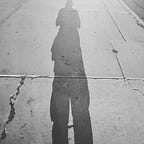Wandering the Ruins
“All of this was here before I showed up.”
I find myself thinking that a lot — sometimes with a sense of profound awe, sometimes with great sadness. I’ve been lucky in a lot of ways: I’ve been to some of the world’s oldest and most significant cities and been given the opportunity to reflect on the gulf of centuries between me and the original builders. Because the story of these things doesn’t stop with them: in time their original purpose falls away, to be replaced by some more contemporary synthesis. Every passing season adds another layer to their story, and they in turn shape the stories of the landscape they inhabit. Sometimes they change completely — churches can always serve as sniper nests; schools as hospitals.
The same thing applies to people. When we’re born, we land squarely in the middle of a world that seems somehow frustratingly finished, even as it steadily falls apart. And without some considerable vigilance, this is exactly what it wants to do. So we wander these places, sometimes settling, sometimes repairing, sometimes claiming. We make our lives in the ruins of the past — that strange civilization that left these streets and high-rises behind for us to find.
In this place, nothing really moves. The decisions were made before and without our consent, and so every great civic construction project is an exercise in the consequences of some other’s past — living in the ruins means that we really spend most of our time rearranging the rubble. And so a city dies when people decide that they’d rather not do this any more. Most often because some cataclysm makes the size of the job suddenly apparent. But it also happens that these places just slowly empty out — we eventually get bored kicking around the same old rocks.
The video game series Fallout illustrates this nicely. The difference between a ruin and a town has something to do with whether or not the residents shoot on sight. Given the shape and scope of cultural history, this doesn’t really mean anything. Plenty of paranoid people have shacked up for the purpose of waving weapons at everyone else. That Jericho had walls is a testament to this basic mechanism of history. When looked at from this light, so many of history’s great conquerers start to feel a bit absurd. What did Alexander the Great really accomplish? Not a lot, but we love to talk about it.
This is what it means to live in the ruins — the world is a reconstructed thing, not a constructed one. Nothing holds this together except the stories we tell about it — if the thread is strained too much, or lost, then our ruins fall away. Life is what happens in the moment — maybe the past is just a projection of what we think we see in the mists of the future? In the same sense that any successful prophecy is simply thought become action, whatever we can convince ourselves to love is that which, for our moment at least, can momentarily reacquire some of its monumentality. To seem, for a moment, less ruinous.
And maybe this is the best lesson of The Tower. Love it while you can, because it’s destined to fall. The trick is always in knowing when (and if) to get clear…
